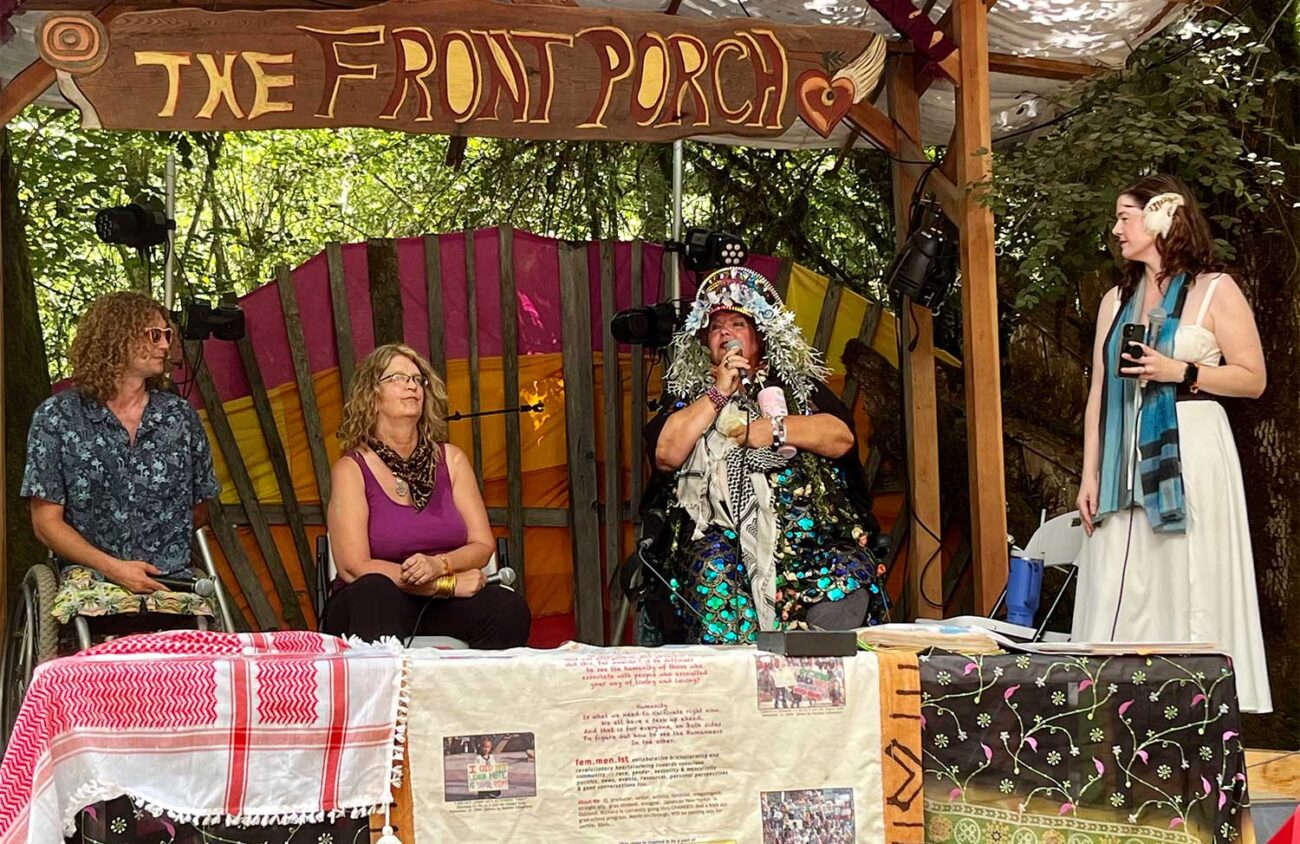By Shasta Kearns Moore
The Oregon Country Fair has been a bright thread woven throughout the fabric of my life. My first Fair was in 1983 — inside my mom’s very large tummy — and I have returned almost every year since.
But that will not be the case for my children. My 14-year-old twins were born three months premature. Both are autistic, have ADHD and one is a power wheelchair user due to his quadriplegic cerebral palsy. The Fair has not been a pleasant experience for them during the handful of times we have tried it.
We are not the only ones who have noticed the Fair has work to do around access and inclusion.
This year, I was honored to moderate a panel discussion on Disability and Fair Access featuring Paralympian Ravi Drugan and his mom Keli Schunk, as well as Oakland, California, activist Maya Scott-Chung. Drugan and Schunk have been longtime fairgoers, whereas this was Scott-Chung’s first experience at Fair, which made for a rich conversation.
Many members of the 4A crew showed up to contribute, too. The OCF’s Access Advocates for the Alter-Abled already does great work offering accommodations. These include: rest areas at the Dragon (main gate) and Community Village, sign language interpretation, powerchair charging, accessible route maps, service dog rest areas, wheelchair rentals and adult-size diaper changing at White Bird Clinic.
We also put out a survey that had 55 responses from fairgoers — though eight of those said they do not go to the Fair anymore because it is inaccessible to them. Respondents were mostly either disabled themselves (57.4 percent) or were friends and family of disabled people (9.3 percent and 24.1 percent, respectively).
Being a word person myself, I was particularly interested to learn that the crowd was split rather evenly on whether they preferred person-first language (“person with a disability”), identity-first language (“disabled person”) or an alternative like the OCF term “alter-abled.”
Most respondents preferred person-first language (40.4 percent) with alternative terms at 32.7 percent and identity-first language at 26.9 percent. (Adjusting for only those who identified as having a disability themselves, person-first and identity-first language were tied at 12 respondents each and seven said they preferred alternatives.)
Almost 90 percent had been to other outdoor festivals, which gave them something to compare to the Fair. On a scale of “terrible” to “fantastic,” most (36.4 percent) thought OCF’s accessibility was middling, with 30.9 percent finding it only a step above terrible.
It’s clear the Fair has some work to do.
For a family of children with significant needs, my family has done a decent amount of traveling, and we have learned a thing or two about the burgeoning new interest in accessible travel. Almost every attraction we’ve been to has an accessibility page with a range of accommodations listed. Nonprofits like KultureCity, which trains staff at venues and then certifies venues that have sensory inclusive modifications, are partnering with these locations to provide sensory bags. Accommodations like these and better information about what disabled fairgoers can expect would go a long way to improving the Fair’s accessibility to people like my sons.
Survey respondents and our guest panelists had many other suggestions, too. These included: Better and cleaner ADA bathrooms (Why are we still talking about these basics in 2024?!); better in-Fair transport options; more benches and rest areas; closer, reservable alter-abled parking; free companion tickets; better heat mitigation (distribute cooling towels); and more awareness of other people’s needs and the history of disability justice.
As is often the case when we listen to our disabled community members, improving these issues could actually improve the experience for everyone. Who hasn’t been overwhelmed by the sensory input at the Fair? Who doesn’t want a cleaner port-a-potty? Who isn’t stunned by the heat?
One of my favorite signs at the Fair says: “Thank you for being us.” It’s time the Fair puts more resources towards making sure the “us” can include folks like my kids.
